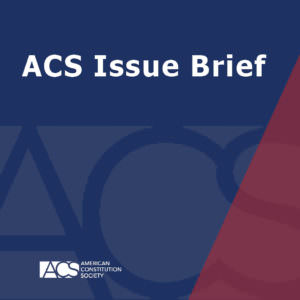Environmental Law after Sebelius: Will the Court’s New Spending Power Limits Affect Environmental State-Federal Partnerships?
Elizabeth C. & Clyde W. Atkinson Professor, Florida State University College of Law
October 1, 2013
 ACS is pleased to distribute “Environmental Law after Sebelius: Will the Court’s New Spending Power Limits Affect Environmental State-Federal Partnerships?,” an Issue Brief by Erin Ryan, Professor of Law at Northwestern School of Law, Lewis & Clark College. Ryan asserts that the Supreme Court’s ruling in the highly charged Affordable Care Act case, National Federation of Independent Business vs. Sebelius, left open “important unanswered questions about new constitutional spending power limits.”
ACS is pleased to distribute “Environmental Law after Sebelius: Will the Court’s New Spending Power Limits Affect Environmental State-Federal Partnerships?,” an Issue Brief by Erin Ryan, Professor of Law at Northwestern School of Law, Lewis & Clark College. Ryan asserts that the Supreme Court’s ruling in the highly charged Affordable Care Act case, National Federation of Independent Business vs. Sebelius, left open “important unanswered questions about new constitutional spending power limits.”
In the Issue Brief, Ryan reviews the potential impact of Sebelius and its spending power limitations on programs of “cooperative federalism,” or those programs where federal and state governments participate in a regulatory partnership. Focusing on environmental law, Ryan first distills Sebelius and its new framework for identifying “unconstitutional coerciveness” in cooperative federalism programs, and then applies the Sebelius framework to an array of environmental regulatory regimes. With the possible exception of the Clean Air Act (CAA), Ryan contends that none of the major environmental laws premised on the spending power bargains appear vulnerable to constitutional challenge. Moreover, after a thorough exploration of the CAA and the Sebelius framework, Ryan ultimately finds it highly unlikely that the law would succumb to a facial challenge. She concludes, however, by predicting that “as a result of Sebelius, the states will have more leverage when negotiating the future terms of spending power bargains and enforcement.”
Read full Issue Brief here: Environmental Law after Sebelius: Will the Court’s New Spending Power Limits Affect Environmental State-Federal Partnerships?
